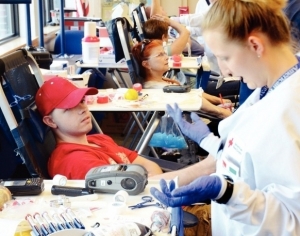Red Cross officials fear summer blood shortage
By Becky Barclay
Published in News on June 10, 2014 1:46 PM

News-Argus file photo
A donor gives blood at a blood drive last year. Red Cross officials are hoping to keep the supply flowing during the summer.
The local blood supply normally drops during the summer months and officials with the Red Cross are hoping young donors will help make up the expected shortfall.
"We typically see a decline in blood donations in the summer," said Kimberly Berrier, Red Cross senior donor recruitment representative. "That happens because any time kids get out of school, family schedules seem to get rearranged a little bit.
"Also, kids not in school and schools don't host blood drives. Families are doing things, and family members don't go to blood drives."
Meanwhile, the need for blood increases. Mrs. Berrier said that with a lot of holiday travel comes an increase in car accidents and even boating accidents.
"People are outside and they're more active," Mrs. Berrier said. "Not to take away from the fun, but the need for blood is still there. What we're asking people to do is just include us on their schedule, not make us their schedule."
One way the Red Cross is trying to take up the slack in summer blood donations is through its "Live. Give. Life." program.
The Red Cross is asking young donors between 16 and 24 to participate in a blood drive and help recruit other donors in that age category.
"It's basically if a 16- to 24-year-old signs up to be a blood sponsor and they recruit at least seven other 16- to 24-year-olds to be blood donors, then they could qualify for a $50 gift card," Mrs. Berrier said. "It's a great incentive that ends Aug. 31."
Also, if rising high school seniors give blood during the summer and also two more times during their senior year, they can earn a red cord to wear at graduation.
Another factor in the decrease in blood supply during the summer is that it's hard to get people to sponsor blood drives at this time of year, Mrs. Berrier said.
"So, if there's nowhere for people to go donate, then those who want to, can't," she said. "And typically we have a challenge getting into businesses during the summer because a good majority of the work force is on vacation. We might get that company to do a blood drive, but get half of what we normally get if we were there in October or November."
But it's still important to get even that much during the summer, Mrs. Berrier said. She said the Red Cross will absolutely do a smaller drive if a company needs to.
Blood drive sponsors are responsible for getting donors.
"Giving blood is a very personal thing," Mrs. Berrier said. "That face-to-face interaction is what's going to get that person to donate, especially that first-time donor."
Any civic group, church, school or business wanting to become a blood drive sponsor will meet with Mrs. Berrier and set up a donor recruitment plan.
Anyone 17 -- or 16 with signed parental consent -- who weighs at least 110 pounds and is in general good health can give blood with some type of photo ID.
The donor is asked to read some Red Cross materials. Then there's a health history and the donor has his or her temperature, pulse, blood pressure and iron level taken.
The donor is then asked about 40 questions about their health history. If everything checks out, then it's on to the donor room. After giving blood, the donor is taken to the canteen for some refreshments.
"A donor should never give blood on an empty stomach," Mrs. Berrier cautioned. "Be fully hydrated and have at least one good meal, although we prefer two, before giving blood. If you're going to donate blood, at least a week in advance start eating red meat, chicken or pork for the protein."
A donor can give blood every 56 days. A double red cell donor can give every 112 days. A double red cell donor gives just red cells, not platelets and plasma like a whole blood donor does. It takes a little bit longer and uses a machine that separates the blood components as the donor is giving blood.
"We do ask that certain blood types donate on the double red cell machine, O negative, O positive, B negative and A negative donors," Mrs. Berrier said. "That's because our hospital customers tend to ask for more of those blood types than others. We like to have A positive and AB positive donors give whole blood so we can get their platelets."
A whole blood donor can help save three lives. A double red cell donor can potentially save five or six lives.
To keep the 102 hospitals in the Carolinas Blood Services Region, of which Wayne County is part, with enough blood to meet their needs, the Red Cross needs 1,300 people to donate every day. The region covers the area from Johnson City, Tenn., all the way to Wilmington.
"People in Wayne County respond well when we need blood," said Tammy Forester, chief executive officer of the Wayne County Red Cross. "They call in here and constantly ask where there's a drive and when they can go. Wayne County has very generous donors."
For more information on giving blood or sponsoring a blood drive, call the Red Cross chapter at 919-735-7201.
